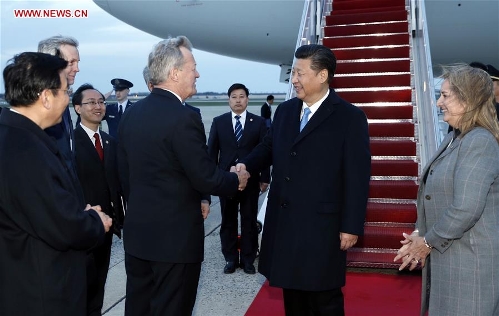HOME >> CHINA
Chinese president arrives in Washington for nuclear security summit
Source:Xinhua Published: 2016-3-31 12:03:45

Chinese President Xi Jinping (2nd R) arrives for the fourth Nuclear Security Summit in Washington, the United States, March 30, 2016. (Xinhua/Ju Peng)
Chinese President Xi Jinping arrived in Washington on Wednesday for the fourth Nuclear Security Summit (NSS) in a sign of his country's firm commitment and constructive approach to safeguarding radioactive materials around the world.
Xi, who also attended the third NSS in The Hague in 2014, is scheduled to address the opening plenary session on Friday to expound China's nuclear security policy, present China's new measures and achievements in the area and put forth a set of practical proposals on further beefing up global nuclear security.
On the sidelines of the summit, Xi is expected to meet with US President Barack Obama on Thursday for their first rendezvous so far this year to promote China-US relationship, one of the most important bilateral ties in the world, and confer with leaders of other countries on issues of common concern.
He will also take part in a leaders' meeting on the Iranian nuclear issue under a sexpartite framework commonly known as P5+1, which comprises the five permanent members of the UN Security Council -- Britain, China, France, Russia and the United States -- plus Germany, and reached a historic agreement with Tehran in July last year over the latter's controversial nuclear program.
The NSS, a biennial event initiated by Obama, will this year draw together leaders and envoys from 52 countries and four international organizations, who will focus on advancing tangible improvements in nuclear security behavior and strengthening the global nuclear security architecture, according to the official website of the 2016 summit.
Much progress has been made since the first NSS was held in Washington in 2010. However, given the rapid development of the nuclear industry and the rampancy of terrorist groups around the world, nuclear terrorism has become an increasingly grave threat to global security.
At a press briefing last week, Chinese Vice Foreign Minister Li Baodong said China hopes that the summit will continuously consolidate the international consensus on nuclear security, advance national capacity-building, boost international cooperation and foster a global nuclear security culture.
China, Li added, will work with all parties concerned to ensure the success of the Washington summit and establish an international nuclear security system featuring fairness, cooperation and win-win results.
Nuclear security cooperation has become a bright spot in China-US interaction. On March 18, Chinese and US senior officials inaugurated a center of excellence (COE) on nuclear security in southwestern Beijing.
As the largest, best equipped and most advanced facility for nuclear security exchanges and training in the Asia-Pacific region, the COE stands as the largest cooperation project jointly financed and built by the Chinese and the US governments in the nuclear sphere. It is an important outcome of the NSS mechanism.
Commenting on the Beijing COE at a briefing on Tuesday, Laura Holgate, a special assistant to Obama and a senior director at the US National Security Council, spoke highly of the project as well as China's leadership in the nuclear security area.
"We're really quite encouraged by the leadership that China is beginning to show in the nuclear security realm, not only in managing its own material but in creating a platform for cooperation regionally and internationally through the Center of Excellence that it's been carrying out," she said.
In a meeting with visiting Chinese Foreign Minister Wang Yi in late February, Obama said that US-China relations are very important and the two sides should maintain communication and coordination, and that he looks forward to Xi's attendance at the upcoming NSS.
The Chinese president arrived in Washington from Prague after his state visit to the Czech Republic, the first by a Chinese head of state in 67 years since the two countries established diplomatic ties.

Chinese President Xi Jinping (2nd R) arrives for the fourth Nuclear Security Summit in Washington, the United States, March 30, 2016. (Xinhua/Ju Peng)
Posted in: Diplomacy